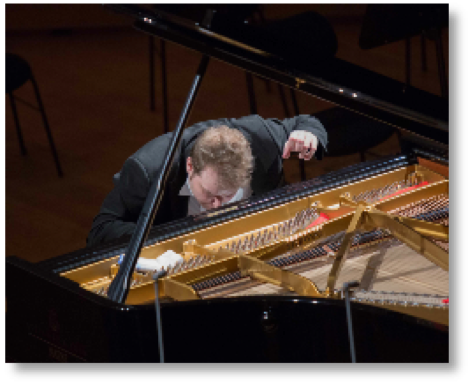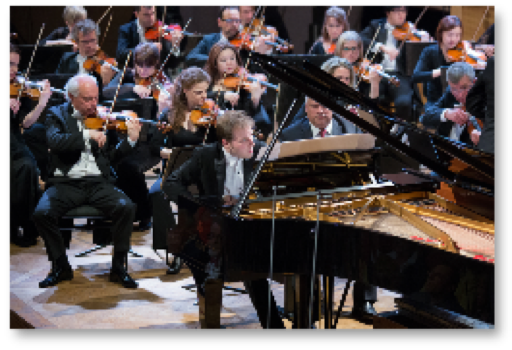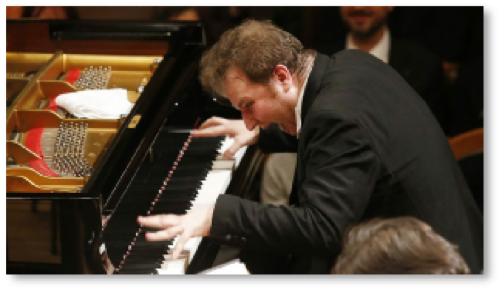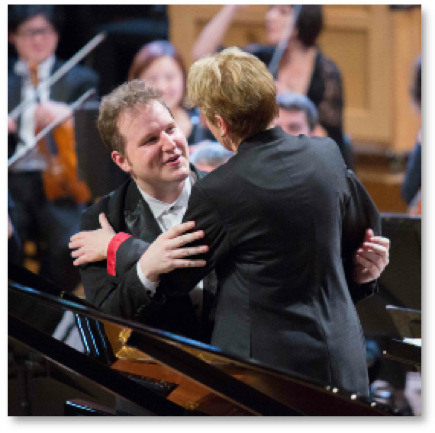Lukas Vondracek
Written by Willem Boone Utrecht, 25 February 2018
I had an interview with the winner of the 2016 Queen Elisabeth Competition, about an hour before he was to play the 3rd piano concerto by Prokofiev. A candid conversation with a shy and humble musician..
Willem Boone (WB): How are you doing since you won this important prize?
Lukas Vondracek (LV): It changed my life quite a bit, I played a lot more than before, more than a hundred concerts! I feel very fulfilled. I went through a child prodigy phase, I had some experience, concerts with maestro Ashkenazy but I realized that winning this prize was life changing.
WB: How surprised were you to win?
LV: I was not really surprised although I didn’t expect anything. I didn’t know what the jury was looking for and I decided for myself to make music as well as I could. It’s out of your hands. It was not the first competition I took part in.
WB: But this was the toughest one?
LV: Yes, for sure. First of all, it’s very long, which is mentally demanding. The repertoire is varied, you had to learn a new piece. On the other hand, it was also most rewarding, even if I hadn’t won
WB: How could it have been rewarding if you hadn’t won?
LV: I tested myself because I had to play under stress and I had to be prepared for new challenges, such as learning a new piece within a short time. I forget the public, throughout the entire competition, I felt a special connection with the audience. They brought out the best in me in a stressful situation.
WB: In Utrecht, the Liszt competition is held every three years and one of the first prize winners said to another pianist who won later “You either have to play the 2nd Concerto or the Totentanz.” Is there anything similar for the Queen Elisabeth Competition where a lot of pianists won either with the 3rd Rachmaninv or the 2nd Prokofiev concerto?
LV: You have to strategize the repertoire a bit, these two are among the most challenging and complex concertos, but you mentioned Frank Braley before who won with the 4rth Beethoven concerto. However, I played the 3rd Brahms sonata, which is not the most flashy piece I know! “Rach 3rd” is a magnificent piece, musically it’s very rich, it has everything..
WB: How do you look back on your performance of Rach 3? I remember it as an incredibly intense performance!
LV: I am an intense player ?, I felt very free. That came as a surprise: I expected to be nervous, but it just seemed to happen. I just let if flow and didn’t have to try harder. I played with Marin Alsop before, she has been a good friend since I was 18.
WB: You also played Mozart’s Concerto in C major K 467, could you have won with that piece as well?
LV: That’s not up to me, but I adore Mozart, he is one of my heroes! I can say that Mozart is a lot harder to play, since his music is so transparent, you can’t hide anything.. It’s good for your soul to play Mozart, he is one of the composers I love most.
WB: People say Mozart is harder to play than Rachmaninov, what do you think?
LV: I agree. I heard many inspiring Rachmaninov performances, whereas with Mozart I rarely heard crystal-clear and inspiring interpretations. He is often associated with lightness and divinity, which is true, but there are also (other) layers in his music that need to come out.
WB: Who plays him well in your opinion?
LV: Uchida would be my number one choice.
WB: How did you feel after the competition: relieved, glad, elated, ..?
LV: Exhausted, there was a lot of media attention I had to take deal with. Back home, it was very special, since I was the first pianist from the Czech Republic to win that prize, I got a lot of attention there too. It was special to be taken to the Royal Palace and it was wonderful to meet the king and queen. Then I had to prepare the tour that was set up for the prize winners when I played almost every day, 21 concerts in total. It was an unforgettable time.
WB: You wrote on your Facebook page: “On May 26, something really special happened: it was as if I was finally unlocked. .. left my comfort zone, allowed myself to be vulnerable as an artist. The music suddenly felt free, inspired, the spirit was soaring. That’s how I felt at least. At that point, I couldn’t care less about the result of the Queen Elisabeth Competition.” Was that regarding the Rach 3? And isn’t it special it happened at such an important stressful moment?
LV: I almost never felt that way before and I played around 1500 concerts! We practise so much, most of the time, you think it’s decent, but often something is missing and now it all came out.
WB: Strange it happened under such pressure?
LV: It was unexpected, but maybe it was what I needed at the time. It meant a lot to me.
WB: Another passage from your Facebook page: “.. played Rach 3 in Cape Town. I have tears in my eyes when I perform it. So many emotions, so many memories. What can be better than playing one of the most incredible pieces of music in the world’s most beautiful city.” It is clearly a concerto that evokes very strong feelings in you, isn’t it?
LV: Yes, it does. A lot of people like the 2nd concerto, which is wonderful of course, but nr 3 is so much more complex, its climaxes in the finale are unique, it’s a life time of a piece!
WB: Do you also play the 4rth piano concerto?
LV: Yes, I play all four concertos. Nr 4 is a great piece too, although it’s quite overlooked. It is not only tricky for the pianist, but also for the orchestra. Rachmaninov was accused of being traditional and composing in the style of Tschaikofsky, however, in this concerto, he tried jazzy elements that were not noticeable before. Yet, he remained nostalgic at heart. It’s very interesting to hear him play with tremendous drive and conviction, yet he was never sentimental or overly emotional.
WB: A quote from YouTube about you: “This man is a personality. He created a new Rachmaninov. We see bursts of energy, passion, anger, but also witness lyrical passages and romance. This experience was a rollercoaster for me, my heart was beating so fast, I almost got a heart attack at certain moments figuratively speaking. I was amazed at his use of certain effects and accents, sudden tempo changes, innovative use of pedal and even improvised passages. All traits of someone who is more than a virtuoso. He deserves to be the winner of this competition.” This was written by Albeto Ferro, being on a near second place. This is some high praise!
LV: I believe he won 6th prize, he also got prizes from the Dutch and French radio. I don’t like to judge my own music making. If you become too complacent, it is the end of your development as an artist. It should be about music, I see myself as a messenger and that should be done successfully.
WB: But you are also the one who unleashes passion, which in my eyes is more than only the messenger?
LV: Yes, music should be only be played if you can’t spend your life without it. I couldn’t, it’s essential to my soul. To do these things, you need a certain amount of charisma!
WB: Another comment I read on YouTube concerning your Rachmaninov: “(…) his working too hard shadowed the music.” What do you think of this?
LV: I respect any opinion. I can only say I believe in the journey I chose and rely on my instincts. It is the result of a lengthy study of a difficult piece. It’s an approach I believe in no matter what comments I receive. I can’t wait for someone to tell you what to do.
WB: You wrote “I was happy to win in a repertoire that is not necessarily mine.”, but you chose the repertoire, didn’t you?
LV: There were a few restrictions, such as the commissioned piece. I had virtually no experience with modern music, it’s repertoire I don’t particularly enjoy. I wouldn’t chose it for myself and that was exactly one of the reasons I wanted to play in Brussels. The repertoire there is a bit of everything contrary to the Chopin and Tschaikofsky competitions that focus on one period.
WB: I have a few questions regarding the concerto you are going to play this afternoon, the 3rd Concerto by Prokofiev. Can you remember the first time you heard it?
LV: It was probably the first recording of Martha Argerich, who is a really special lady and an incredible virtuoso. The orchestra chose this concerto
that I have done many times, but I am still finding my way with it. It’s great of course, yet I am not entirely comfortable.. Prokofiev can be overwhelming: his style is very convincing, however, it’s difficult to find a balance as it is lyrical, ironic, sarcastic.. You can easily sound too aggressive.
WB: I think it’s the perfect example of a piano concerto: virtuosic, but it also has an important orchestral part, it’s lyrical, playful, sometimes with a lot of bite. What do you think?
LV: There are many times when it sounds lovely, but that’s not what Prokofiev meant. There is also fake beauty and sarcasm, he is unpredictable and can kill you any moment..
WB: I think it’s very representative of Prokofiev’s style, more so than in the 2nd concerto. Would you call it the most classical of his piano concertos?
LV: Yes, indeed. The 2nd has tremendous power, but the 3rd is a better composition. You can’t play his 2nd concerto on any given day!
WB: How difficult is Prokofiev 3rd as opposed to Rach 3rd?
LV: It’s not that difficult, actually a lot easier than Rach 3rd. The style is very different, Rachmaninov fits the hand, Prokofiev was a good pianist, but not as instinctive. You need to practise more to get it. Prokofiev 3rd was written in a mathematical way. You have to be very alert mentally. It’s mostly about chords and octaves, there are not so many scales. It’s certainly not easy, but it sounds more difficult than it is, although there are some unplayable passages!
WB: Where for example?
LV: For instance the hand crossings in the first movement. It has to do with the seize of my hands: my fingers are fat and that makes things sometimes uncomfortable. In the second movement, there are some tricky passages too. The top register chords at the very end are uncomfortable as well.
WB: I love the end of the second movement with the gong!
LV: Of course, it’s hard to place it together, it almost never happens.
WB: The structure of this concerto is interesting: three movements that each have lyrical intermezzi.
LV: I love the lyrical variations of the second movement: it sounds mysterious after all the drama. It shouldn’t sound overly romantic though, the simpler, the better. Many people add extra rubati. I think you don’t need to add anything, if you follow his instructions, it makes perfect sense.
WB: The variation that comes after the lyrical one is almost scary in its violence!
LV: Exactly, I love the way Prokofiev builds up the intensity. It’s exciting, but you have to make sure not to rush. This sometimes happens when nerves kick in..
WB: I always wonder at the end of the third movement, do you need to play these fast passages as glissandi or as rapid scales?
LV: The way he wrote them is unplayable! You have to play two keys with one finger at the time and it looks like an octopus (laughs). I try to come as close as possible to his notation. It’s not that important though to hit every note, what you need is a clustered sound. These passages are more effective when played with rhythmical precision.
WB: Martha Argerich rushes there too!
LV: Yes she does, but with such huge charisma!
WB: She owns the concerto…
LV: Absolutely!
WB: Some colleagues of yours, Abdel Rahman el Bacha and Plamena Mangova, said that Bartok’s piano concertos are difficult to put together with an orchestra, what about this concerto?
LV: It’s not easy, neither for the orchestra, nor the soloist. You have much less freedom than in Rach 3, where the piano is more prominent. I think my performances of Friday and last night went well!
WB: Dmitri Mitripolos and Van Cliburn both conducted and played this piano concerto, would you ever consider doing this?
LV: It’s nowadays becoming fashionable, but at the moment, I am not interested. It’s quite an art to be a great conductor..and it is not my calling. I have no time to dedicate myself to conducting, it’s the same with composing. There are so many wonderful conductors and composers, I don’t know what I could contribute to either of these..
WB: Couldn’t Ashkenazy convince you?
LV: He is a wonderful person, I learnt from him to be inspiring, to stay humble, to work hard and to enjoy the journey. He told me one day I’ll be successful.
WB: He must be one of the hardest working persons in the business!
LV: Yes, his repertoire is so huge. He loves practising, but now he has arthritis.
WB: Where does he find the time to do all this?
LV: He is a very fast learner, he is almost like a child, always with this enormous energy and joy. It is quite touching to see. His wife is a big help in his life, she keeps him in touch with reality.
WB: He is a heck of a pianist!
LV: His colours and sound are unique, they are so full and rounded. I can recognize when I hear him on the radio, he has a very special way of approaching the piano. You can say he has a symphonic understanding of sound.
WB: Beethoven once said that music can make you a better person, do you agree?
LV: Yes, I think so, although it is hard to generalize. You can really grow with music and project your struggles, joy, sorrow. For children, it is a wonderful tool to learn patience. Structure, beauty, discipline are all present in music.
WB: What are your plans for the future? Are you going to make recordings?
LV: Yes, I think with the Czech Philharmonic Orchestra, but we are still working on the repertoire. I must say I am not that much of a fan of the recording process. Nothing can replace a live performance. I feel I sound better live than on recordings.
WB: What is your relationship with the instrument?
LV: I am happy when people see me as a musician first and then as a pianist. The piano is just a beautiful box to realize your ideas. Many people indulge in the possibilities of the piano and there is nothing wrong with that but sometimes I wonder whether the essence of music shouldn’t be more universal. Music is all encompassing and the piano has probably most possibilities. I wouldn’t say I am in love with the instrument but I am in love with music. It can be frustrating: you have sounds in your mind, you try the instrument and it’s badly regulated. You still have to try and make the best of it. Then again, great music can sound on any instrument.
WB: But are you still happy to play the piano?
LV: Yes, it’s still one of the best decisions to play the piano! I wouldn’t call it a “job”, sometimes members of the orchestra say that they need to get “the job done”, I find that a horrible attitude, for me it’s a pleasure!
WB: What should I say to you: “Break a leg”?
LV: I remember a concert in Paris where I actually broke a leg before I entered on stage!
WB: Then I’d better not say anything at all! :-)
Written by Willem Boone




Redactie e-mailadres:
info@pianovrienden.nl
Pianovrienden | 2024